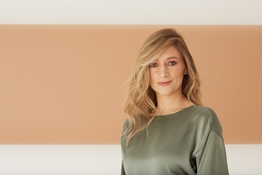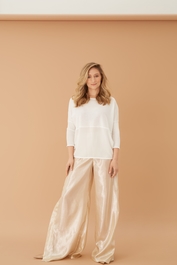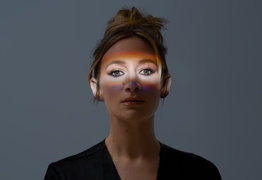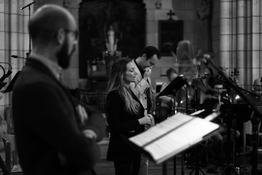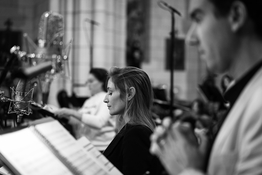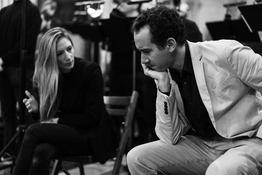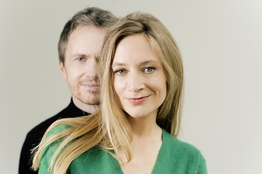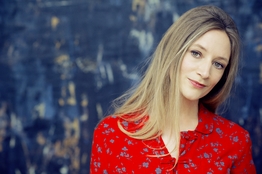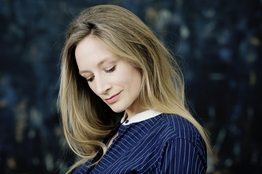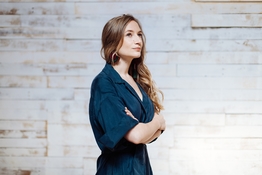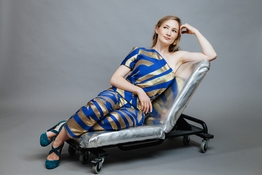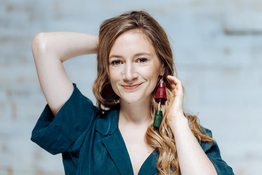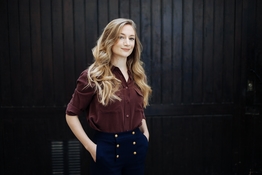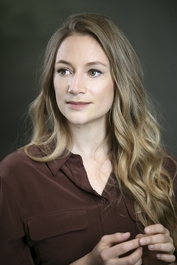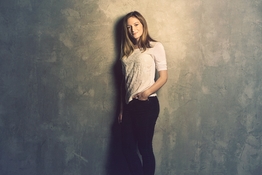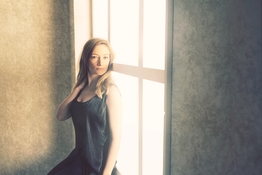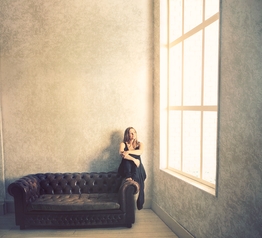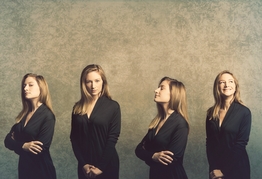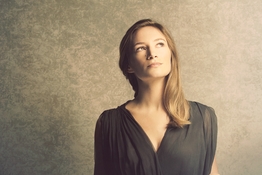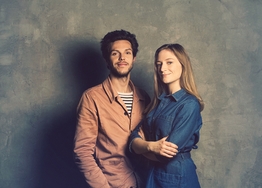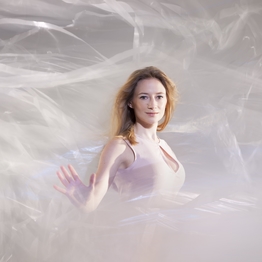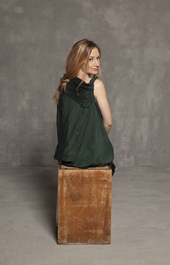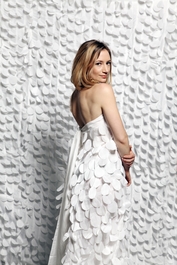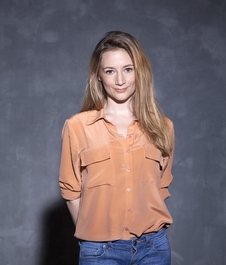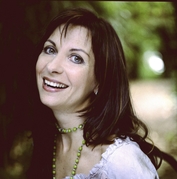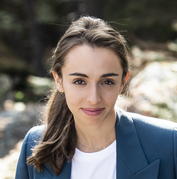

Sabine Devieilhe
News
“This is possibly the most personal programme I’ve recorded so far”
Great sorrow and great joy, expressed in in sacred and secular arias and cantatas, are the themes of Sabine Devieilhe’s album of Bach and Handel – two supreme masters of the baroque era, both born in Germany in 1685. Recorded with the Pygmalion ensemble and conductor Raphaël Pichon, the album features appearances by baritone Stéphane Degout and lutenist Thomas Dunford and includes Bach’s cantatas ‘Mein Herze schwimmt im Blut‘ and ‘Jauchzet Gott in allen Lande’, and excerpts from Handel’s Brockes Passion and Giulio Cesare.
“This is possibly the most personal programme I’ve recorded so far,” says Sabine Devieilhe, whose Erato catalogue includes albums devoted to the music of Mozart and Rameau. “Johann Sebastian Bach has been part of my life as a musician since the very early days. I would hear it at Mass on Sunday … When I took cello lessons I learned Bach’s solo suites … And now I’ve been lucky enough to record this album with the Pygmalion ensemble and my husband Raphaël Pichon, who has been part of my musical life – and of course of my personal life – for a long time.
“We really wanted to convey the idea of human emotion that at times goes beyond our understanding, and which creates music of extraordinary drama. That kind of emotion can be found in secular music, like opera, as much as in sacred music. I wanted to demonstrate that through the music of both Bach and Handel.
“You could say that contrasts are almost the essence of Bach’s music and he has a genius for bringing light to darkness, but also for bringing shadows to those moments where you feel you can almost reach Paradise. This is especially true of his cantata No 199, ‘Mein Herze schwimmt im Blut‘. It’s full of sorrow, even tortured, but it also has a disarming restraint that is typical of Bach. It is a cantata of repentance, asking forgiveness for our sins, and I wanted to bring out its operatic power: the first accompanied recitative in the cantata goes beyond many expectations of sacred music.
“By contrast, Bach’s cantata No 51, ‘Jauchzet Gott in allen Landen’ is an expression of pure joy. The soprano dialogues with a trumpet in the first movement – it’s very virtuosic, but the technical demands are always at the service of a spirit of exultation. Bach expects his singers to become instruments. We have to go beyond ourselves and sound like a trumpet or an oboe or a double bass, but the emotion is always authentically human and personal, even in its sacred dimension.
“I think that singing Bach is one of the most difficult things a singer can do. Not only does the precision of the intonation and the shaping of the phrases have to be deeply instrumental, Bach also plays with the extremes of the vocal range and writes lines with leaps and frequent chromatic notes. His music is extremely difficult to master, whereas Handel is very much in the spirit of bel canto.
“A highlight of my career was playing Bellezza in a staging by Krzysztof Warlikowski of Handel’s early oratorio Il trionfo del tempo e del desinganno” This was in 2016 at the Aix-en-Provence Festival; the production was released in an Erato DVD. “When it came to this Bach and Handel project, it seemed a natural choice to include the aria that closes the work. It achieves a wonderfully ethereal beauty.”
Devieilhe will soon be performing the multi-faceted role of Cleopatra, on stage, in Handel’s opera Giulio Cesare. “Cleopatra is more than just a powerful woman,” she says “She is emblematic, and I wanted to put her beside the soprano of Bach’s cantatas. When it comes to tears, Cleopatra only weeps in private. When she gives in to her sorrow, she is not so far away from the voice in Bach’s cantatas, and I feel that the two composers shed a particular light on each other in this context.
“In both his sacred and secular music Handel makes the most of the voice, showing off its timbre, whereas with Bach you have to build everything from scratch, while remaining at the service of the text, the meaning, and the genius of the harmony. As a musician you have to work at this music on your own to make it sound as easy as possible in performance and to bring its theatrical element alive.”
The album was recorded in Paris in December 2020. Speaking at the sessions, Sabine Devielihe said: “After all the disruption that has been caused by the pandemic, this week of recording has felt like being together as a family in a little oasis. It has been a very happy time for all of us, working on a programme that Raphaël and I put together with extra special care. We are very aware of how lucky are to have been able to perform this music, which both brings solace and is about the search for solace.”
Sabine Devieilhe and Alexandre Tharaud reimagine audience favourites on ‘Chanson d’amour’
Two leading French musicians bring their customary clarity and finesse to a recital of works by four composers who defined the path of the French art song or mélodie from the late 19th to the mid-20th century. Soprano Sabine Devieilhe and pianist Alexandre Tharaud have assembled an imaginatively balanced programme of Fauré, Debussy, Ravel and Poulenc. Extending from the 1870s to the 1940s, it juxtaposes audience favourites – such as Fauré’s discreetly passionate ‘Après un rêve’ and Poulenc’s nostalgic waltz ‘Les Chemins de l’amour’ – with more rarely heard songs.
“The title of the album, is taken from a song by Fauré, ‘Chanson d’amour’,” explains Alexandre Tharaud. “It evokes love, but our programme also includes songs inspired by folklore [Ravel’s enchanting Cinq Chansons populaires grecques], war [Poulenc’s forlorn, yet exquisite ‘C’] and death [Fauré’s ‘Les Berceaux’ and Ravel’s ‘Ballade de la reine morte d’aimer’] … Sabine and I chose wide-ranging repertoire … We started off with the two song cycles – Ravel’s Greek songs and Debussy’s Verlaine settings, Ariettes oubliées – and these became the pillars of our programme. We then chose individual songs, aiming both for diversity and for the occasional surprise.”
“Debussy and Ravel were musts for me,” says Sabine Devieilhe. “They simply had to be included in our programme. Fauré, as their spiritual father, was a natural choice, and Poulenc offered something spicier and spikier. We were able to conceive the programme as a recital, taking the listener somewhere new.”
“These four composers belong to the same lineage and you can hear the way they relate to each other,” continues Alexandre Tharaud. “Debussy and Ravel are like two half-brothers who were both weaned on Fauré’s music. They absorbed his melodic craft, the way he connects with the voice, that special sense for a dialogue between voice and piano and for instrumental writing of great delicacy. Everything comes together in Poulenc, since the influence of the three older composers can be heard in all his vocal music.
“All these songs have been recorded before, but songs like Ravel’s ‘Sur l’herbe’ and ‘Chanson française’ are not often heard, either on disc or in the concert hall. These four composers handled voice and piano, and their interplay, with enormous subtlety. Sometimes the piano can be like an orchestra, but it can also tone itself down in response to the text, achieving its aims with great economy of means. I’m thinking of the ‘blue notes’ that Chopin liked so much and which can be found here in such songs as the Ariettes oubliées, Poulenc’s ‘Hôtel’ and Ravel’s ‘Trois Oiseaux de paradis’, in which the composer even asks the piano to play a melody with no accompaniment, creating the impression of a dialogue between two singing voices. I dream of a piano that could really sing.”
“The first time Alexandre and I performed together was when we recorded Rachmaninov’s ‘Vocalise’ for Erato, and our musical rapport was obvious,” adds Sabine Devieilhe. “Though that piece has no text, I could hear the way Alexandre created meaning on the piano – whether conversational, melancholy or defiant. Now, with this ‘love song’, we are both able to savour the texts. There are countless colours in these French songs and it was our mission to bring those colours out.”
2018 BBC Proms line-up revealed: Joyce DiDonato, Jean Rondeau and more!
The BBC Proms has revealed its 2018 programme, with several French classical stars making their Proms debut.
On 5 September, Joyce DiDonato reprises the role of Dido in highlights from Berlioz's Les Troyens, this time with John Eliot Gardiner and his Orchestre Révolutionnaire et Romantique. The American mezzo's recent recording with the Orchestre Philharmonique de Strasbourg and maestro John Nelson won the BBC Music Magazine Award for Best Opera Album earlier this month.
French coloratura soprano Sabine Devieilhe will take to the Royal Albert Hall stage for the first time on 26 July in Debussy's sensual cantata La Damoiselle élue, marking the centenary of the French composer's death. She sings Debussy on her latest album of French arias and songs, Mirages.
In another important French debut, Romantic pianist extraordinaire Bertrand Chamayou plays Mendelssohn's First Concerto on 20 July, with the BBC National Orchestra of Wales.
At Cadogan Hall, on 23 July, Jean Rondeau: another Frenchman in another Proms debut, this time an all-French harpsichord recital including music by Royer (from his album Vertigo), François Couperin and a world-premiere by Eve Risser.
Violinist Renaud Capuçon was in London recently for the launch of his Bartók concertos album with the London Symphony Orchestra. He returns 19 August with the Orchestre de la Suisse Romande as soloist in an orchestration of the Ravel Violin Sonata in G Major.
Soprano Diana Damrau sings her heartland repertory, songs by Richard Strauss, with the Royal Liverpool Philharmonic Orchestra and Vasily Petrenko.
A conductor very much familiar to London audiences, Sir Antonio Pappano, brings his Italian Orchestra dell'Accadamia Nazionale di Santa Cecilia to town for Bernstein's Symphony No.1 marking the centenary of the American composer's birth in August. Pappano has recorded the complete Bernstein Symphonies and The Age of Anxiety with the same orchestra and pianist Beatrice Rana for release later this year.
Discover the complete 2018 BBC Proms line-up here.
Sabine Devieilhe wins big at the 2018 Victoires de la Musique Classique
Warner Classics & Erato artists were out in full force at the 2018 Victoires de la Musique Classique on Friday in Evian, France. French coloratura soprano Sabine Devieilhe dominated the Victoires this year in its 25th-anniversary edition, winning two of the seven awards, and both categories in which she was nominated.
Not only was she crowned Artiste Lyrique de l’Année (Opera Singer of the Year); she also claimed Album of the Year for her French opera recital Mirages, along with Les Siècles orchestra and conductor François-Xavier Roth.
In 2013 Devieilhe received the Opera Singer 'Revelation' of the Year at the 20th Victoires de la Musique; the same year she signed an exclusive recording contract with Erato.
'Since the beginning I’ve cherished this album and wanted to record it even early on in my singing career. I’ve always appreciated this French music which seems so beautifully aligned with my voice. François-Xavier Roth is an exceptional conductor who defends this repertoire with admirable fervor. Thank you to the magnificent performers on the album, Les Siècles, Alexandre Tharaud, Marianne Crebassa, and to Alain Lanceron at Warner Classics and Erato for his trust and support throughout all our recording adventures.’ She also thanked her family for supporting her in a demanding yet richly rewarding career choice.
To a live televised audience of 1.3 million viewers on France 3, Devieilhe sang the opening aria from the album: André Messager’s sumptuously romantic ‘Le jour sous le soleil béni’ from the little-known operetta Madame Chrysanthème.
Equally celebrated at the ceremony was legendary soprano Angela Gheorghiu, who accepted the Victoire d’Honneur for Oustanding Achievement and performed ‘Un bel dì, vedremo’ from Puccini’s Madama Butterfly, accompanied by the Orchestre de l’Opéra National de Lyon and conductor Pierre Bleuse. The accolade comes just months after Gheorghiu’s highly anticipated return to the recording studio for her new album of Italian verismo arias, Eternamente.
Other standout performances on French classical music’s night of nights included cellist Gautier Capuçon’s The Swan, from his new album Intuition (he was also nominated for Instrumental Artist of the Year), and Polish countertenor Jakub Józef Orliński with Italian Baroque orchestra Il pomo d’oro for Vivaldi’s Vedrò con mio diletto. Recently signed to Erato, Orliński has recorded his solo album debut with Il pomo d’oro for release later this year.
Congratulations to all the nominees, winners and performers at the 2018 Victoires de la Musique Classique!
Sabine Devieilhe crowned Artist of the Year in France's CLASSICA 'Choc' Awards
CLASSICA magazine has named young French soprano Sabine Devieilhe Artist of the Year in the prestigious 'Choc de l'Année' awards.
Sabine accepted the prize in last night's ceremony at the Philharmonie de Paris - coincidentally, in the same hall where she recorded her new album Mirages with Les Siècles orchestra, conductor François-Xavier Roth and pianist Alexandre Tharaud.
Last week, just days after the album's release, she performed the Mirages program - including rare French jewels by André Messager and Maurice Delage alongside her signature aria, Lakmé's Bell Song - in a triumphant recital at the Philharmonie that left the audience under the spell of her vocal agility and the pure, focused yet voluptuous quality of her tone.
CLASSICA wrote of Mirages: "Spun with enchantment, the new album from Sabine Devieilhe traces an imaginary voyage aroudn the world. With her collaborators François-Xavier Roth and Alexandre Tharaud, she brings us along to discover heroines as touching as they are transcendent, from music by Messager, Debussy, Berlioz, Delage..."
In a word, according to CLASSICA: 'Magique.'
Mirages is out now.
Three GRAMMY nominations for Warner Classics & Erato
The nominations for the 59th GRAMMY Awards have been announced, with three Warner Classics and Erato releases among the Classical albums to receive the nod.
A milestone release from Poland has been nominated in the Best Choral Performance category: the first volume in a series entitled Penderecki Conducts Penderecki, in which the legendary 82-year-old composer helms the Warsaw Philharmonic Orchestra and Choir and distinguished soloists in both new works (including the world premiere of his Dies illa) and iconic masterpieces.
French soprano Sabine Devieilhe's tribute to the women in Mozart's life, The Weber Sisters, is up for Best Classical Vocal Album.
In the same category is British tenor Ian Bostridge's new recital with Sir Antonio Pappano at the piano, Shakespeare Songs, exploring four centuries of Shakespearean poetry in song to mark the 400th anniversary of the Bard's death.
The GRAMMY winners will be announced on 12 February 2017 in a Los Angeles ceremony. See the complete list of nominees here.
Gramophone Awards: Antonio Pappano, Vilde Frang & Sabine Devieilhe among winners
The winners of the 2016 Gramophone Classical Music Awards have been revealed, with Warner Classics and Erato recordings claiming prizes in three of the twelve categories.
The coveted Best Opera award this year goes to Warner Classics' widely acclaimed studio recording of Verdi's Aïda conducted in Rome by Sir Antonio Pappano, with an all-star cast (Anja Harteros, Jonas Kaufmann, Ludovic Tézier, Erwin Schrott, Ekaterina Semenchuk) and the Orchestra e Coro dell'Accademia di Santa Cecilia.
Gramophone praised the "orchestral playing of rare accomplishment from an Italian ensemble which is alive to the opera’s every word," while hailing soprano Anja Harteros "the most interesting Aida on record since Callas."
Norwegian star violinist Vilde Frang was up against stiff competition including Janine Jansen, Daniil Trifonov and Maria João Pires but came out on top for the Best Concerto Recording with her deeply personal, intense readings of Britten and Korngold Violin Concertos. The Gramophone critics were captivated by this "exciting player" and her "urgently communicative, potentially transformative accounts" of these two twentieth-century masterpieces.
"Playing with almost intimidating dexterity and polish, not to mention impeccable intonation (it comes as no surprise to discover that Anne-Sophie Mutter was an early mentor), her music-making still manages to project an impression of honesty and naturalness."
Young French soprano Sabine Devieilhe's star has well and truly risen with her second album for Erato, The Weber Sisters, which wins Best Recital exploring the arias Mozart wrote for three opera-singer sisters - his first love, his wife, and the first Queen of the Night. Devieilhe portrays these three 'characters' with effortless grace and thrilling highs.
"The programme centres around three magnificent showpiece arias for Aloysia, famed both for her expressive cantabile and her coloratura prowess," explained the Gramophone critic. "Among her specialities were sustained pianissimo high notes; and I can’t imagine they were more delicately floated than they are by Sabine Devieilhe, a lyric coloratura who combines a pure, sweet timbre and dazzling virtuosity."
Both Vilde Frang and Sir Antonio Pappano are in the running for the Artist of the Year award, which will be announced - along with the winners of Recording of the Year, Young Artist of the Year, Lifetime Achievement and Label of the Year - during the awards ceremony at London's St John's Smith Square on September 15 (streamed live by medici.tv).
The 2016 Gramophone Awards shortlist has been revealed
The prestigious Gramophone Awards shortlist has been announced, showcasing the finest classical recordings over the past year, as chosen by the leading classical music magazine's critics and specialists.
Seventy-two recordings have been shortlisted across twelve categories. The top three recordings in each category will be revealed in next issue of the magazine, which goes on sale on August 12.
There are particularly strong contenders in the Vocal categories, with French soprano Sabine Devieilhe - noted by Gramophone for her "pure, sweet timbre and dazzling virtuosity" - up against the likes of Jonas Kaufmann and Max Emanuel Cencic for her multi-award-winning Mozart album The Weber Sisters (Recital category).
Fresh from singing David Bowie at the BBC Proms in London, French countertenor Philippe Jaroussky is in the running for another prize, this time as one of the cast-members in Il Pomo d'Oro's magnificent triple-album recording of the Handel opera Partenope, welcomed by Gramophone as “a landmark event”.
Joyce DiDonato is a strong candidate for the Solo Vocal category for her live double album from Wigmore Hall Joyce & Tony, with her esteemed recital partner Sir Antonio Pappano at the piano in everything from Italian arias to the Great American Songbook.
In Opera, Pappano's Verdi Aïda, the all-star triple album studio recording from Rome, is a clear frontrunner, with tenor Jonas Kaufmann as Rademes - he is nominated again in the same category for his Pagliacci. Gramophone declared soprano Anja Harteros "the most interesting Aïda on record since Callas"; both she and maestro Pappano have been nominated for the public-voted Artist of the Year.
Among the Instrumental selections, Bertrand Chamayou does his countryman Ravel proud in the complete works for solo piano on a double album.
The Concerto category sees young Norwegian violin virtuoso Vilde Frang holding her own alongside the likes of Janine Jansen, with the recent Gramophone Recording of the Month, her "urgently communicative" Britten and Korngold Violin Concertos.
The Chamber category sees two Erato string quartets nominated for two sublime releases: the French Quatuor Ebène for their Schubertalbum featuring baritone Matthias Goerne and cellist Gautier Capuçon, and the German Artemis Quartet's searing Brahms, their last recording with the late, lamented violist Friedemann Weigle, which cellist Eckart Runge sees as "imbued with a sense of warmth, immediacy, friendship and love that is interwoven with a more spiritual, timeless beauty”.
See the full shortlist of the 2016 Gramophone Award nominees here.
Valentine's Day with Sabine Devieilhe's 'portrait of Mozart in love'
"What is it that so melts our hearts in these lines that we can sometimes memorise after listening to them just once? The naturalness of the sentiment. To read between the notes and bring out the theatre in them, as if fulfilling the composer’s own written instructions – that is the challenge for the interpreter. Through our encounter with the Weber sisters, these women and dedicatees who counted so much in Mozart's life, we have tried to sketch a portrait of Mozart in love." -Sabine Devieilhe, The Weber Sisters
This Valentine's Day, let Mozart serenade you with the music inspired by the loves of his life - the three enigmatic, musical Weber Sisters (rebuffed by Aloysia, he married Constanze, and wrote for Josepha the stratospheric notes of the Queen of the Night).
In the aria Alcandro Io confesso...Non so d'onde viene, Devieilhe sings: "His face, his look, with an unexpected feeling which stirs me to the depths of my being. I wrack my thoughts for an explanation, but do not find it. Just gods, what can this be that I feel? I do not know whence comes this feeling of tenderness..."
Sabine Devieilhe embodies all three in this unique concept album, recorded with her husband, conductor Raphaël Pichon, and the Pygmalion period-instrument orchestra - truly a labour of love. Mozart to make your heart melt, indeed.
They have saved the best for last with a hidden track reveling in Mozart's famous wicked streak. Find it on The Weber Sisters, out now.
Nominations for the Victoires de la Musique have been revealed
Nominations for the Victoires de la Musique Classique - the French classical GRAMMYs - have been unveiled for 2016.
Two of the three nominated albums for Recording of the Year are acclaimed Erato releases. Mozart: The Weber Sisters (coloratura soprano Sabine Devieilhe's "portrait of Mozart in love", with Ensemble Pygmalion and conductor Raphaël Pichon), has already won the 2015 Charles Cros Académie award for Album of the Year, and a Classica 'Choc d'Année'.
Maestro Philippe Jordan and the Orchestre de l'Opéra National de Paris are also up for a Victoire with their sumptuous Ravel album: Daphnis et Chloé and La Valse.
In the Instrumental Soloist category, Toulouse-born pianist Bertrand Chamayou is among the finalists. His complete survey of Ravel's solo piano music, due to be released in January 2016, will undoubtedly set the tone for a bright year in classical music.
Erato is delighted to welcome a newly signed artist to the label's roster among the three Opera Singer of the Year nominees: French mezzo-soprano Marianne Crebassa, with exciting recording projects to be announced soon.
Among the exceptional young talents nominated for Revelation of the Year in the Instrumentalist category are two remarkable string players: the newest member of the Ebène Quartet, violist Adrien Boisseau, and 16-year-old violinist/cellist Camille Berthollet, who won the televised French talent contest Prodigies last year and has already achieved Gold Album status with her debut recording on Warner Classics.
The winners in the 23rd Victoires de la Musique Classique will be announced in a ceremony televised on France 3 from Toulouse on 24 February, featuring surprise soloists with the Orchestre National du Capitole de Toulouse conducted by Tugan Sokhiev.
Recording of the Year
Mozart / The Weber Sisters
Sabine Devieilhe, Pygmalion / Raphaël Pichon
Erato
Ravel / Daphnis & Chloé, La valse
Orchestre et chœur de l’Opéra national de Paris / Philippe Jordan
Erato
Yes !
Julie Fuchs - Orchestre national de Lille / Samuel Jean
Deutsche Grammophon
Instrumental Soloist of the Year
Bertrand Chamayou, piano
Adam Laloum, piano
Magali Mosnier, flute
Opera Singer of the Year
Marianne Crebassa, mezzo-soprano
Stéphane Degout, baritone
Karine Deshayes, mezzo-soprano
Revelation of the Year (Insturmental Soloist)
Camille Berthollet, violin
Adrien Boisseau, viola
Lucienne Renaudin-Vary, trumpet
Revelation of the Year (Opera)
Guillaume Andrieux, baritone
Elsa Dreisig, soprano
Jérémy Duffau, tenor
Composer of the Year
Richard Dubugnon - Concerto sacra Op.67 for Oboe and Orchestra
Philippe Hersant - Cantique des trois enfants dans la fournaise
Bruno Mantovani - In and Out, Concerto for timpani and orchestra
Related releases










Upcoming Concerts
Sunday
Wednesday
Saturday
Tuesday
Sunday
